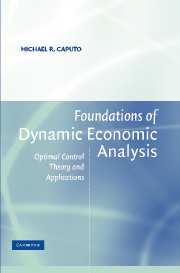Book contents
- Frontmatter
- Contents
- Foreword by Eugene Silberberg
- Preface
- 1 Essential Elements of Continuous Time Dynamic Optimization
- 2 Necessary Conditions for a Simplified Control Problem
- 3 Concavity and Sufficiency in Optimal Control Problems
- 4 The Maximum Principle and Economic Interpretations
- 5 Linear Optimal Control Problems
- 6 Necessary and Sufficient Conditions for a General Class of Control Problems
- 7 Necessary and Sufficient Conditions for Isoperimetric Problems
- 8 Economic Characterization of Reciprocal Isoperimetric Problems
- 9 The Dynamic Envelope Theorem and Economic Interpretations
- 10 The Dynamic Envelope Theorem and Transversality Conditions
- 11 Comparative Dynamics via Envelope Methods
- 12 Discounting, Current Values, and Time Consistency
- 13 Local Stability and Phase Portraits of Autonomous Differential Equations
- 14 Necessary and Sufficient Conditions for Infinite Horizon Control Problems
- 15 The Neoclassical Optimal Economic Growth Model
- 16 A Dynamic Limit Pricing Model of the Firm
- 17 The Adjustment Cost Model of the Firm
- 18 Qualitative Properties of Infinite Horizon Optimal Control Problems with One State Variable and One Control Variable
- 19 Dynamic Programming and the Hamilton-Jacobi-Bellman Equation
- 20 Intertemporal Duality in the Adjustment Cost Model of the Firm
- Index
- References
18 - Qualitative Properties of Infinite Horizon Optimal Control Problems with One State Variable and One Control Variable
Published online by Cambridge University Press: 05 June 2012
- Frontmatter
- Contents
- Foreword by Eugene Silberberg
- Preface
- 1 Essential Elements of Continuous Time Dynamic Optimization
- 2 Necessary Conditions for a Simplified Control Problem
- 3 Concavity and Sufficiency in Optimal Control Problems
- 4 The Maximum Principle and Economic Interpretations
- 5 Linear Optimal Control Problems
- 6 Necessary and Sufficient Conditions for a General Class of Control Problems
- 7 Necessary and Sufficient Conditions for Isoperimetric Problems
- 8 Economic Characterization of Reciprocal Isoperimetric Problems
- 9 The Dynamic Envelope Theorem and Economic Interpretations
- 10 The Dynamic Envelope Theorem and Transversality Conditions
- 11 Comparative Dynamics via Envelope Methods
- 12 Discounting, Current Values, and Time Consistency
- 13 Local Stability and Phase Portraits of Autonomous Differential Equations
- 14 Necessary and Sufficient Conditions for Infinite Horizon Control Problems
- 15 The Neoclassical Optimal Economic Growth Model
- 16 A Dynamic Limit Pricing Model of the Firm
- 17 The Adjustment Cost Model of the Firm
- 18 Qualitative Properties of Infinite Horizon Optimal Control Problems with One State Variable and One Control Variable
- 19 Dynamic Programming and the Hamilton-Jacobi-Bellman Equation
- 20 Intertemporal Duality in the Adjustment Cost Model of the Firm
- Index
- References
Summary
Since the publication of Samuelson's Foundations of Economic Analysis (1947), economists have been aware of the importance of developing theories that are, at least in principle, refutable. As you may recall, refutable theories are those that lead to well-defined predictions about potentially observable variables in response to perturbations in parameters, as well as curvature properties, homogeneity restrictions, and reciprocity or symmetry results. Such empirically interesting models are the standard fare in the static theory of the consumer and firm, and via duality theory, these models have been subjected to numerous tests of their veracity.
In contrast, the economics literature using dynamic optimization models contains many analyses that are deficient in testable implications. For example, many authors usually state the problem under consideration, derive and economically interpret the necessary conditions, make some reference to sufficient conditions, discuss the existence and multiplicity of steady state equilibria, and finally, analyze the stability of the steady state equilibria. Although all these aspects are important, they do not represent a complete picture of an optimal control model, for the qualitative properties of the model are not examined.
The purpose of this chapter is to examine a ubiquitous class of optimal control models for its particular mathematical structure that leads to steady state comparative statics and local comparative dynamics refutable propositions. The class of optimal control problems under consideration is one with an infinite time horizon, time entering explicitly only through the exponential discount factor, a single state variable, a single control variable, a time-independent vector of parameters influencing the integrand and state equation, a given initial state, and an optimal solution that converges to the steady state solution as an indefinite amount of time passes.
- Type
- Chapter
- Information
- Foundations of Dynamic Economic AnalysisOptimal Control Theory and Applications, pp. 481 - 510Publisher: Cambridge University PressPrint publication year: 2005



